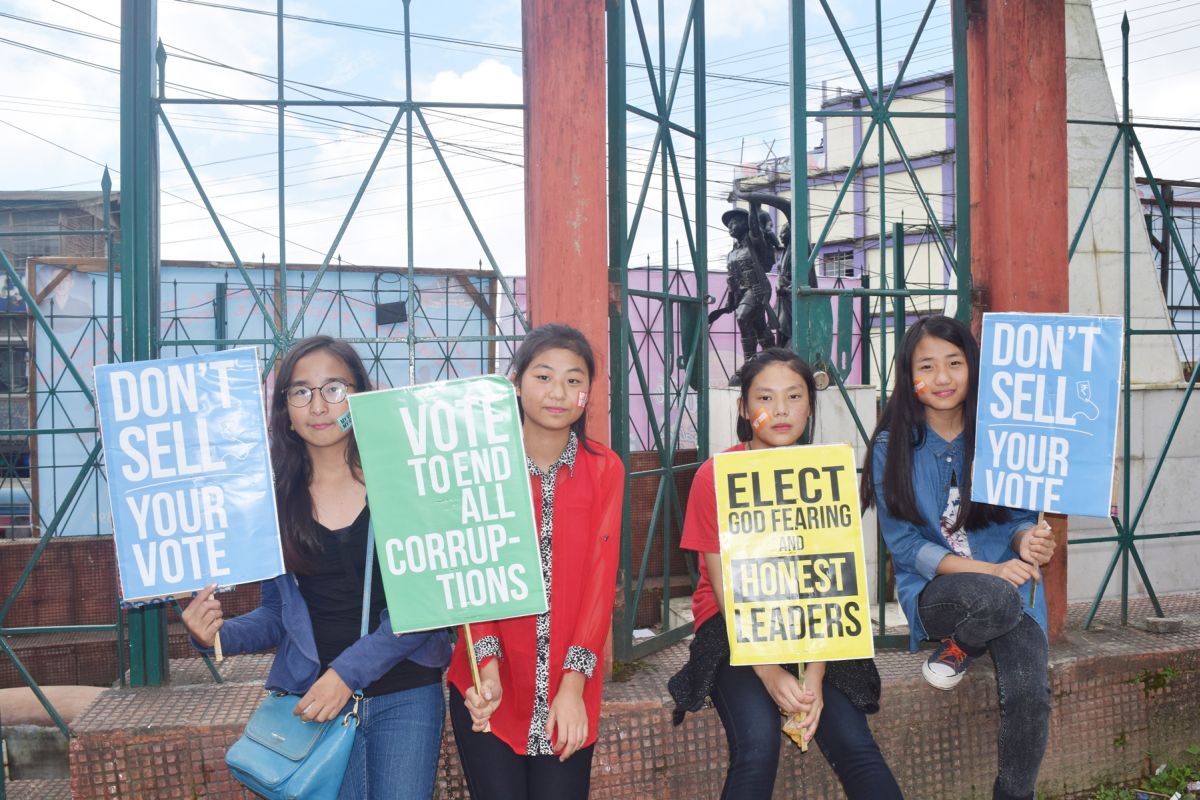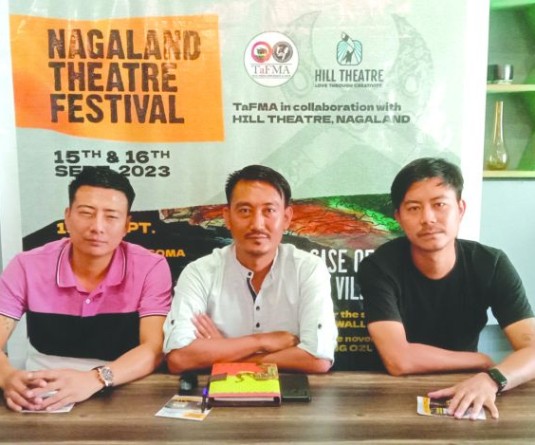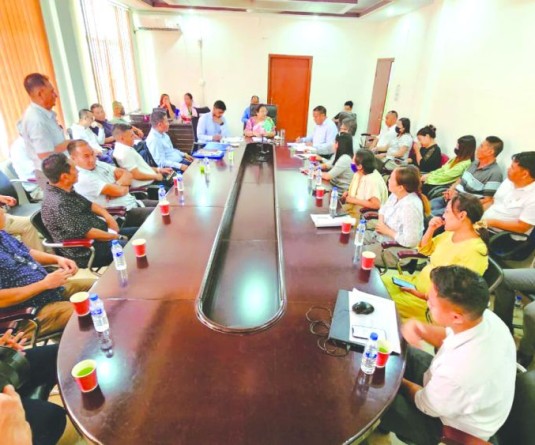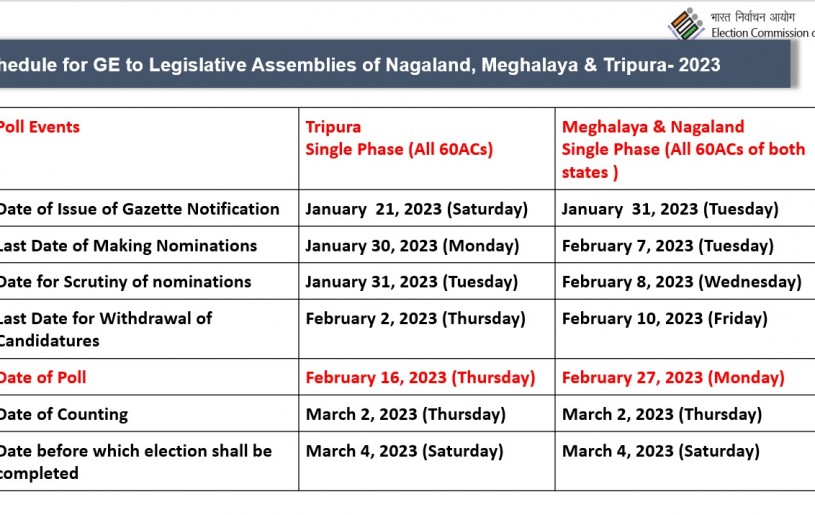Naga women’s pursuit for equality

A group of young girls hold placards in support of clean election in Kohima. (Morung File Photo)
Atono Tsükrü Kense
Kohima | March 6
“Naga society doesn’t discriminate its women on any ground. Our women have equal privileges as men and enjoy equal opportunities in various spheres unlike other women from other parts of the country.”
These are some familiar (mis) perception that Naga people have been romanticizing with, ever since the political imbroglio that arose following the demand of 33% reservation of seats for women in the Urban Local Bodies (ULBs) election in 2017.
Absence of women in decision making bodies’ viz. Nagaland Legislative Assembly, village councils, village development board etc contradicts this common belief.
As a patriarchal society, gender discrimination is apparent in Naga society, as prejudice against women is deeply rooted in the age-old customs of the Nagas with ‘gender specified roles’. Herein, the role of women is confined to home and men are taught to deal with issues outside the purview of home.
Even as the state is fast developing and almost at par with other parts of the world, ‘gender equality’ is something which stands as a ‘far-fetched’ dream, due to the fact that men feel threatened of their existence with the misconception that it would take their rights away.
As the world celebrate the International Women’s Day on March 8 with the theme “I am generation equality: realizing women’s rights” many Naga women feels that gender equality is yet to be achieved, and that gender equality is not about keeping women comfortable and loved, but social, political and economic equality of both men and women.
Dismantling ‘unrealistic and oppressive standards’ of masculinity
“Gender equality is not a man Vs woman issue, it pertains to our mindsets,” viewed Dr Theyiesinuo Keditsu, assistant professor and commented that attaining gender equality is not only about fighting for women rights, it is also about dismantling the impossibly unrealistic and oppressive standards of masculinity that our patriarchal society imposes on our men.
The academician implied that ‘we’ cannot achieve success in one without addressing the other, and opined that while we tackle the subjugation of women, we must also confront the glaring multitude of male casualties who turn to various addictions, succumb to depression, paralyzed mediocrity or petty crime and violence because our definition of what is a man is just too narrow to accommodate everyone.
Thus, she maintained that realising women's rights ought to and can only happen if we re-adjust our notion of masculinity.
Conveying that she is a feminist but not a revolutionary, Dr Keditsu stated matter of fact that expecting or trying to get overnight change becomes confrontational, violent and the resulting hurt and fear works against our goal.
Towards this, she suggested that a gentler method, in which enlightened women and men join together to educate others and work to change mindsets and raise empathetic children who understand the necessity of gender equality, may take generations, but will ultimately ensure a more just society.
Women as policy makers
Founder of YouthNet, Hekhani Jakhalu Kense viewed that when half the population has ‘absolutely no say or voice’ in the decision making, there is no way that there is a balanced and healthy growth of the state or our people in general.
When enquired if Naga women are treated equally to men, Kense acknowledged that women are much loved and cared, however, observed that women are seen as liabilities as most women don't have access to or control over the family’s financial resources.
Gender equality, she pointed out is not about keeping women comfortable and loved, but gender equality means social, political and economic equality of both men and women. As the world over, including indigenous community, are aggressively working towards a gender balance society not only for social but economic growth, Kense underlined that Naga women have a say in the policy and decision making bodies for an inclusive growth, otherwise holding on to our pride of being ‘unique’ people will do injustice to our children and our children’s future.
Sharing her dreams for Naga women, Kense said, “I want to see our women as policy makers, our women spinning the economy of our state. If Nagaland has to grow and compete with the rest of the world, our women will have to be given political and economic space side by side with our men.”
Gender equality for
a progressive society
“Our search for our identity (where we stand and what we hold) is one most pressing issue confronting woman in the context of Nagaland” observed Mezivolu T Therieh, NJS, Chairperson, Phek District Legal Services Authority & District & Sessions Judge, Phek.
Substantiating her views, Therieh said, “When we speak our rights, it may not be taken as freedom of speech and expression, but a threat to the existence of the other half of the society.”
“The manner in which our society understands gender justice is that women are trying to take away the rights of men,” said Therieh and added that “till we understand that gender inequality disturbs the economic growth and hinders developments, gender justice will remain a far cry and we will not be a progressive society.”
Stating that girls and women still face discrimination and violence, she asserts that until and unless the mindset of both male and female changes, “our girls and women will continue to suffer injustice be it socio-economic and political rights.”
Noting that Naga women have no equal rights in economic, social, decision making, ancestral property etc, Therieh was of the view that it is due to insufficient legislated laws to safeguard our people, property etc.
“This may perhaps be one reason why our men folks get alarmed when women start speaking of their rights,” opined Therieh and insisted that laws need to be legislated to protect our tribal rights besides gender sensitization and awareness.
Lack of wholesome
empowerment
Nagaland State Commission for Women, chairperson, Khrienuo Tachü conceded that Naga women are quite empowered in a non-aggressive way, nevertheless, inspite of the literacy rate in Nagaland, empowering factor is yet to come to the fore.
Observing that wholesome empowerment of women is what we are lacking in Nagaland, Tachü keeping in mind quality education as an empowering tool emphasized that current system of educated should be looked into.
Towards this end, she revealed that apart from collaborating with strategic agencies towards women empowerment, the Commission is also patronizing traditional unpaid works of women such as cooking Naga traditional cuisines or weaving traditional attires paid jobs.
She also shares her dream of visualizing Naga women in a few years’ time as “humble, learned and skilled Naga women.”






